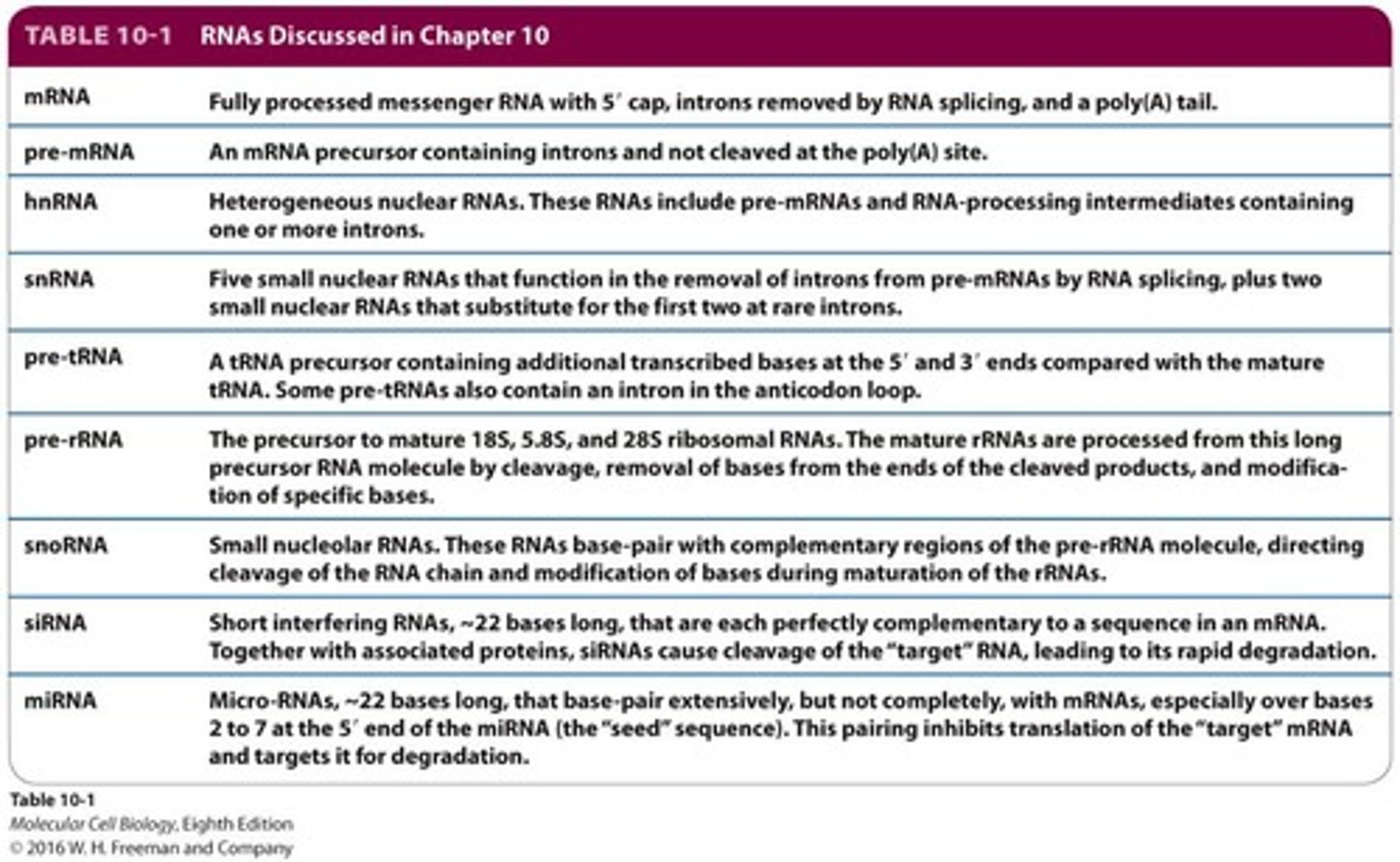Eukaryotic Pre-mRNA Processing and Regulation
1/146
There's no tags or description
Looks like no tags are added yet.
Name | Mastery | Learn | Test | Matching | Spaced | Call with Kai |
|---|
No analytics yet
Send a link to your students to track their progress
147 Terms
Pre-mRNA
Initial RNA transcript processed before translation.
Capping
Addition of 7-methylguanylate to 5' end.
Polyadenylation
Addition of ~250 A residues at 3' end.
Splicing
Removal of introns and joining of exons.
Spliceosome
Complex that catalyzes pre-mRNA splicing.
Transesterification
Chemical reaction during mRNA splicing.
Exons
Coding regions of pre-mRNA retained after splicing.
Introns
Non-coding regions removed during splicing.
SR proteins
Proteins that assist in splicing regulation.
snRNPs
Small nuclear ribonucleoproteins involved in splicing.
Cross-exon recognition complex
Complex that specifies correct splice sites.
Alternative splicing
Use of different exons to produce varied mRNAs.
mRNA degradation
Process controlling mRNA stability and translation.
Exosome complex
Degrades improperly processed mRNAs in the nucleus.
Translation initiation factors
Proteins that begin mRNA translation at 5' cap.
P bodies
Cytoplasmic structures where mRNA is degraded.
miRNA
Regulatory RNAs that inhibit mRNA translation.
tRNAs
Transfer RNAs transcribed by RNA polymerase III.

rRNAs
Ribosomal RNAs transcribed by RNA polymerase I.
Poly(A) tail
String of adenine nucleotides at mRNA 3' end.
Cleavage enzyme
Enzyme that cuts primary transcript at poly(A) site.
Branch-point adenosine
Adenosine crucial for lariat formation during splicing.
Polypyrimidine tract
Sequence aiding splicing near intron 3' end.
5' GU and 3' AG
Consensus sequences at intron splice sites.
Translation regulation
Control of protein synthesis from mRNA.
Nuclear exosomes
Degrade RNA precursors in the nucleus.
Cytoplasmic poly(A) polymerase
Enzyme controlling poly(A) tail synthesis.
5' cap
Modified guanine nucleotide protecting mRNA from degradation.
RNA polymerase II
Enzyme responsible for transcribing mRNA from DNA.
snRNA
Small nuclear RNA involved in pre-mRNA splicing.
U1 snRNA
Base-pairs with 5' splice site in splicing.
U2 snRNA
Base-pairs with branch-point A during splicing.
snRNPs
Small nuclear ribonucleoprotein particles formed by snRNAs.
5' splice site
Location where U1 snRNA binds pre-mRNA.
Branch-point A
Key nucleotide for U2 snRNA binding.
Transesterification reaction
Chemical reaction during splicing involving RNA.
Spliceosome
Complex of snRNPs and proteins for splicing.
SF1
Splicing factor 1 that binds branch-point A.
U2AF
U2 snRNP associated factor binding polypyrimidine tract.
First transesterification
Forms 2′,5′-phosphodiester bond in splicing.
Second transesterification
Joins exons with a 3′,5′-phosphodiester bond.
Lariat structure
Formed from excised intron during splicing.
Debranching enzyme
Converts lariat intron into linear RNA.
Exon definition
Process of identifying exons in long pre-mRNAs.
SR proteins
Proteins that enhance exon recognition in splicing.
ESEs
Exonic enhancer sequences recognized by SR proteins.
RS domains
Protein interaction domains rich in arginine and serine.
GU-AG rule
Splicing sites recognized by proximity to exons.
Cooperative binding
SR proteins enhance binding of snRNPs to splice sites.
SMN1 gene
Gene encoding protein crucial for motor neuron function.
SMN2 gene
Gene with silent mutation affecting splicing.
Exon skipping
Inhibition of exon inclusion in mRNA due to mutations.
Poly(A) tail
3' end modification of eukaryotic mRNAs.
Cleavage and polyadenylation
Coupled process for mRNA maturation in eukaryotes.
Intron
Non-coding sequence removed during mRNA splicing.
Exon
Coding sequence retained in mature mRNA.
Mutations in splicing
Alterations that can block or restore splicing.
Average exon length
Approximately 150 bases in human pre-mRNAs.
Average intron length
Approximately 3500 bases in human pre-mRNAs.
CPSF
Binds upstream AAUAAA polyadenylation signal.
CStF
Interacts with downstream GU/U-rich sequences.
CFI and CFII
Stabilize RNA complex during processing.
PAP
Stimulates cleavage at poly(A) cleavage site.
Cleavage factors
Released after RNA cleavage occurs.
Downstream RNA cleavage product
Rapidly degraded post-cleavage.
PABPN1
Binds initial poly(A) tail, signals PAP.
Poly(A) tail
Short A residues added to RNA's 3' end.
Exosome
Digests RNAs, including introns.
Exosome core
Nine-subunit complex, catalytically inactive.
Rrp44
Subunit with processive 3'→5' exonuclease activity.
Nuclear exosome
14 subunits, processes RNA in nucleus.
Mtr4
RNA helicase that associates with exosome.
Alternative promoters
Generate different mRNAs from the same gene.
Alternative splicing
Produces various mRNA forms from primary transcript.
RNA-binding proteins
Regulate splicing by binding near splice sites.
RNA editing
Alters amino acids encoded by mRNA codons.
Sex-lethal (Sxl) protein
Intronic splicing silencer in female Drosophila.
Tra protein
Promotes specific Dax splicing in females.
Dsx transcription factor
Regulates sex-specific gene expression.
Female Dsx isoform
Activates genes for female characteristics.
Male Dsx protein
Represses genes for female characteristics.
Premature stop codon
Results from exon 3 inclusion in males.
Cooperative binding
Tra and SR proteins activate female splicing.
Cleavage/polyadenylation
Occurs at 3' end of exon 4.
Developmental stages
Different mRNA forms arise during organism development.
Single-stranded RNA path
Path through the exosome for RNA processing.
Rrp6 and Rrp47
Heterodimer associates with exosome core.
Catalytically active exosome
10-subunit complex with active RNA processing.
Chicken cochlea
5-mm tube with auditory hair cells for sound frequency.
Auditory hair cells
Neurons responding to specific sound frequencies.
Ca2+-activated K+ channel
Channel opening regulated by intracellular Ca2+ levels.
Transmembrane α helices
Seven helices forming the structure of K+ channels.
Cytosolic domain
Part of the channel that regulates its opening.
Channel isoforms
Different versions of channels from alternative splicing.
mRNP exporter
Facilitates mRNA transport across nuclear pore complex.
Nuclear pore complex (NPC)
Structure allowing mRNA transport from nucleus.
Exonic splicing enhancers (ESEs)
Sequences aiding in exon recognition during splicing.
SR proteins
Proteins that bind to ESEs for splicing.
Pre-mRNA
Mature mRNA precursor before splicing.
Exons
Coding regions of pre-mRNA, average 150 bases.